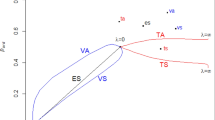Abstract
We compare play in private and public committees when insiders care both about how well the committee decision serves organizational goals, and about the rewards which outsiders give for representing their interests. We show that a private committee reaches decisions which better serve organizational goals than either a public committee or the median insider choosing alone; and that a committee can only exhibit a norm of consensus if insiders vote in private. Finally, any insider who does not vote for a private committee’s decision must vote for a decision which better serves organizational goals; whereas a dissident in a public committee votes for a decision which worse serves organizational goals.
Similar content being viewed by others
References
Austen-Smith D, Feddersen T (2005) Deliberation and voting rules. In: Austen-Smith D, Duggan J (eds) Social choice and strategic decisions. Springer, Heidelberg
Baland J-M, Robinson J (2008) Land and power: theory and evidence from Chile. Am Econ Rev 98: 1737–1765
Berger H, Nitsch V (2008) Too many cooks? committees in monetary policy. Mimeo
Bernheim D, Peleg B, Whinston M (1987) Coalition-proof Nash equilibria: I. concepts. J Econ Theory 42: 1–12
Blinder A (2004) The quiet revolution: central banking goes modern. Yale University Press, New Haven
Brady C (1999) Collective responsibility of the cabinet. Parliam Affairs 52: 214–229
Calkins R (1965) Grand jury secrecy. Michigan Law Rev 63: 455–490
dal Bo E (2007) Bribing voters. Am J Political Sci 51: 789–803
de Haan, J (eds) (2000) The history of the Bundesbank. Routledge, New York
Diermeier D, Myerson R (1999) Bicameralism and its consequences for the internal organization of legislatures. Am Econ Rev 89: 1182–1196
Elster J (1998) Introduction. In: Elster J (eds) Deliberative democracy. Cambridge University Press, Cambridge
Groseclose T (2007) ‘One and a Half Dimensional’ preferences and majority rule. Soc Choice Welf 28: 321–335
Groseclose T, Milyo J (2010) Sincere versus sophisticated voting in congress: theory and evidence. J Politics 72: 1–14
Harrington B (2008) Pop finance: investment clubs and stock market populism. Princeton University Press, Princeton
Hubbard G (2005) The financial system and the economy, 5th edn. Addison-Wesley, Reading
Issing O (1999) The eurosystem: transparent and accountable or ‘Willem in Euroland’. J Common Mark Stud 37: 503–519
Kinzer B (1982) The ballot question in nineteenth century English politics. Garland, London
Levy G (2007) Decision making in committees: transparency, reputation and voting rules. Am Econ Rev 97: 150–168
Mayhew D (1974) Congress: the electoral connection. Yale University Press, New Haven
Meade E (2005) The FOMC: preferences, voting and consensus. Fed Reserve Bank St. Louis Rev 93–101
Meade E, Stasavage D (2008) Publicity of debate and the incentive to dissent. Econ J 118: 695–717
Meade E, Sheets N (2005) Regional influences on FOMC voting patterns. J Money Credit Banking 37: 661–677
Note (1983) Public disclosures of jury deliberations. Harvard Law Rev 96: 886–906
Pound J (1988) Proxy contests and the efficiency of shareholder oversight. J Financial Econ 20: 237–265
Romano R (2003) Does confidential proxy voting matter? J Leg Stud 32: 465–509
Seidmann D (2008) Optimal quotas in private committees. Econ J 118: 16–36
Seidmann D (2008b) A theory of voting patterns and performance in private and public committees. Available at http://www.nottingham.ac.uk/economics/cedex/papers/2009-06.pdf
Snyder J, Ting M (2005) Why roll calls? A model of position-taking in legislative voting and elections. J Law Econ Organ 21: 153–178
Stasavage D (2007) Polarization and publicity: rethinking the benefits of deliberative democracy. J Politics 69: 59–72
Swank J, Swank O, Visser B (2008) How committees of experts interact with the outside world. J Eur Econ Assoc 6: 478–486
Visser B, Swank O (2007) On committees of experts. Q J Econ 122: 337–372
von Hagen J (1999) Money growth targeting by the Bundesbank. J Monet Econ 43: 681–701
Author information
Authors and Affiliations
Corresponding author
Rights and permissions
About this article
Cite this article
Seidmann, D.J. A theory of voting patterns and performance in private and public committees. Soc Choice Welf 36, 49–74 (2011). https://doi.org/10.1007/s00355-010-0464-7
Received:
Accepted:
Published:
Issue Date:
DOI: https://doi.org/10.1007/s00355-010-0464-7




